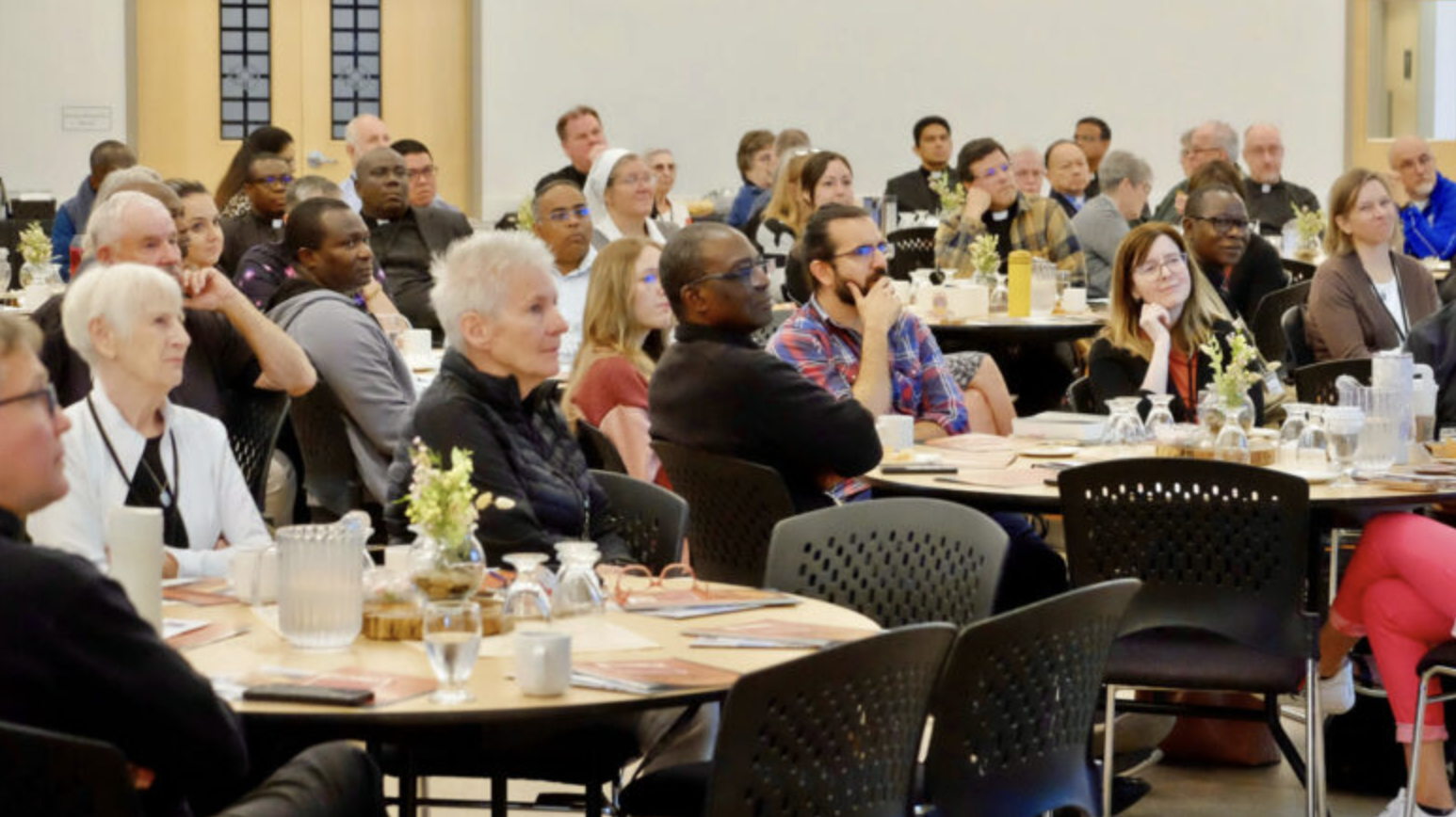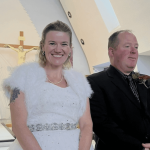SASKATOON, SASK. (CCN) — Parish representatives, pastors, and ministry leaders from across the Roman Catholic Diocese of Saskatoon gathered Sept. 18 for an annual Administration Day featuring updates and information for the year ahead.
Bishop Mark Hagemoen provided an overview of the diocesan mission for this year, which continues to reflect that of the diocesan Pastoral Plan: “To Proclaim Christ and God’s Kingdom Today” and “To have the same mind and heart as Christ Jesus” (Phil 2:5).
The bishop reflected on the past year in the universal Catholic Church — in particular the death of Pope Francis and the election of Pope Leo XIV. In a time of war in many parts of the world, Pope Leo’s opening words, “Peace be with all of you,” resonate in a powerful way, Hagemoen said.
Another theme this year includes synodality, with the implementation phase of the Synod on Synodality underway around the world, including in the Diocese of Saskatchewan.
Synodality — with its focus on being led by the Holy Spirit on a path of unity, listening, communion and co-responsibility — has the potential to be an antidote to the terrible divisions, polarization and conflicts in our world, said Hagemoen.
“The Jubilee Year and the Synod inspire and urge us to move beyond slogans and assumptions, to really being present and in-relationship with one another,” the bishop said, adding that this also continues to resonate with the ongoing work of truth and reconciliation in the diocese and across the country.
Various diocesan offices offered updates, inducing in the areas of faith formation on justice and peace, prison ministry and health care.
Hospital Chaplaincy
The Saskatchewan Health Authority Volunteer Services department has re-instated the “spiritual care question” when a patient is admitted into the hospital, which was dropped a number of years ago, said Jacqueline Saretsky said, coordinator of hospital chaplaincy . “Thankfully, they are starting to acknowledge that denominational chaplains are in the hospitals, and that we are there to help support patients,” Saretsky said, noting that right now the question requesting spiritual care does not apply to those admitted through the emergency department. “They are working on getting the nurses oriented to asking that question when a patient gets admitted to the floor, so we are making progress.”
A second project underway is the creation of a pamphlet by the Catholic Health Association of Saskatchewan (CHAS) entitled “Accompaniment through serious illness: A guide to conversations on death and dying.” CHAS is currently developing the resource with input from across the province, responding to “the problem of lack of (spiritual care) volunteers, because people are afraid to talk to people about dying, they don’t know how,” said Saretsky.
“The brochure is meant to encourage people to become more comfortable talking about death and dying, and help alleviate the fear of the unknown,” she said, adding that its purpose is not to catechize people and it does not specifically address assisted suicide/euthanasia. “If there were more of us accompanying people at the end of life, there may be less people contemplating MAiD out of fear and loneliness.”
Prison Ministry
Diane Anderson, coordinator of the diocesan office of restorative ministry, who provides outreach to men at the Saskatoon Correctional Centre, spoke about a new initiative by Saint Anne Parish in Saskatoon to offer the Rescue Project at the prison.
Anderson invited Daniel Pettipas to come forward to speak about the latest program being offered by volunteers. As parish coordinator of evangelization and adult faith formation, Pettipas has been involved with running the Rescue Project program at Saint Anne Parish. A parishioner, who had recently joined the church and who was greatly impacted by the Rescue Project himself, suggested taking the program to the prison.
Supported by Anderson, a team of four went in to present the video-based program to men at the correctional centre. “The guys who come down for the Rescue Project have made us feel so welcome, and so loved. There is a brotherhood there that I wasn’t expecting. There is a real sense of community,” Pettipas said.
Justice and Peace
Myron Rogal provided an overview of justice and peace initiatives in the diocese of Saskatoon.
He began with a focus on Returning to Spirit, which earlier this year returned to the diocese. The Indigenous-led program has been delivering reconciliation workshops since 2001, including the one held this June in Saskatoon.
“Through group process, conversation and personal process, Return to Spirit grounds participants in reclaiming responsibility to work through key obstacles to reconciliation.” These obstacles include blaming self and others, difficulties letting go of the past, a preoccupation with surviving, pride, and fear, Rogal said.
“The program teaches the simplicity of shifting from a place of resentment to one of acceptance, from resignation to ambition, victimhood to responsibility, cynicism to inspiration,” he said, sharing the impact of the workshop described by participants at the June workshop in Saskatoon.
Office of migration update: refugee sponsorship
Hannah Enti-Brown, coordinator of the migration office, provided an overview of the office’s work administering the diocese’s role as a government-designated Sponsorship Agreement Holder (SAH).
Refugees vetted by the Canadian government are fleeing war, violence and persecution and are forced to leave their home country to survive. “We welcome the stranger, extending Christ’s teachings in action,” she said.
Recent changes by the federal government have eliminated other kinds of private sponsorships and cut down on the numbers of refugees that are welcomed into Canada, Enti-Brown said.
Allocations have dropped from about 65 a year to only 30, and there are more sponsorship requests each year than spots available, she reported. A diocesan selection committee has been formed to review applications to ensure an equitable distribution of sponsorship spots.
“Constituent groups do what we call ‘pre-settlement,’ which is helping to get the application ready for submissions,” said Enti-Brown, “and when the families do arrive, they do what we call ‘post-settlement’”, constituting of anything they need to get their lives in Canada in place.
Continuing the policy “need not creed” articulated by the late Fr. Paul Donlevy who oversaw refugee outreach in the diocese for many years, the migration office and its constituent groups welcome refugees of all religions, not just Christians.
Enti-Brown invited parishes to consider sponsoring refugees.
“Turn Debt Into Hope” – DPCC campaign
Guest speakers Michelle Dinter-Lipinski and Norman Lipinski provided an overview of the work of Development and Peace-Caritas Canada (DPCC).
Serving as interim provincial animators for DPCC, the couple from St. Philip Neri Parish in Saskatoon promoted the fall education and action campaign, “Turn Debt into Hope,” which includes a petition asking Canada’s legislators to forgive the debts of the world’s poorest countries during this Jubilee Year. The goal is to collect 100,000 signatures nationwide.
The Lipinskis referred to the pastoral letter, issued by the Canadian bishops, on the debt-relief campaign, in which they noted the success of a similar campaign in the year 2000.
“At that time, over $100-billion dollars was forgiven from the debt of over 30 countries,” said Norman Lipinski. “It was considered to be a huge success.”
However, the structures that created the debt remain in place, the bishops said.
“Many of these same countries find themselves in the same or worse positions than they were 25 years ago,” Norman Lipinski said.
Three billion people live in countries that spend more on paying interest on their debts to richer countries than they spend on health care or education, he added.




